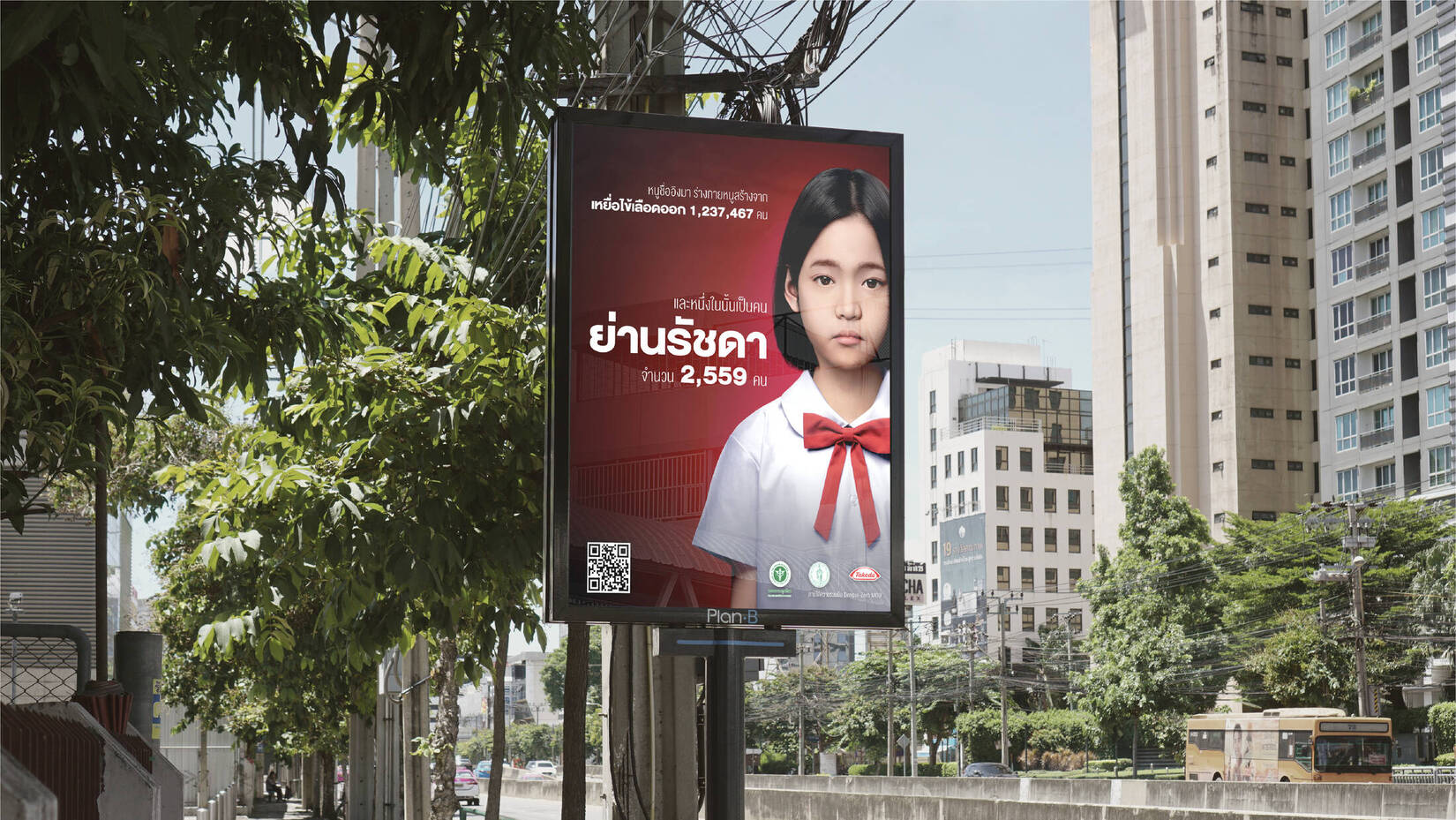SINGAPORE, Dec 15 – Ingma, a Thai schoolgirl composite avatar of over 1.2 million dengue fever patients from the past 15 years, ominously declares that dengue is a life-threatening emergency for everyone.
“I exist as a warning sign to you all,” says the “virtual human” in a video released in June 2022. “Do not underestimate dengue.”
Ingma was launched on Asean Dengue Day last year in a collaboration campaign by Thailand’s Department of Disease Control, the Bangkok Metropolitan Administration, and pharmaceutical company Takeda Thailand.
“Ingma’s story has been viewed by more than 35 million viewers and published by over 100 publications locally,” Dr Apinya Niramitsantipong – deputy director of vector-borne diseases at the Department of Disease Control in Thailand’s Ministry of Public Health – told the first APIC (Asia Pacific Immunization Coalition)-Asia Dengue Voice & Action Group (ADVA) Asia Pacific Summit in Singapore last October 31.
Besides 17 million views online, Ingma received 18 million views offline through billboards posted around the country. She had 518 per cent more views and unique visitors online compared to other content in Thailand’s Department of Disease Control.
Dr Niramitsantipong explained that Ingma was created to communicate to Thais in both rural and urban areas about dengue.
“Ingma’s main concern is that dengue can occur everywhere, whether in the city or rural areas,” he said.
“Dengue is a risk for every age group. The symptoms of dengue range from asymptomatic to severe; there’s no specific treatment for dengue and you can get dengue more than once.”
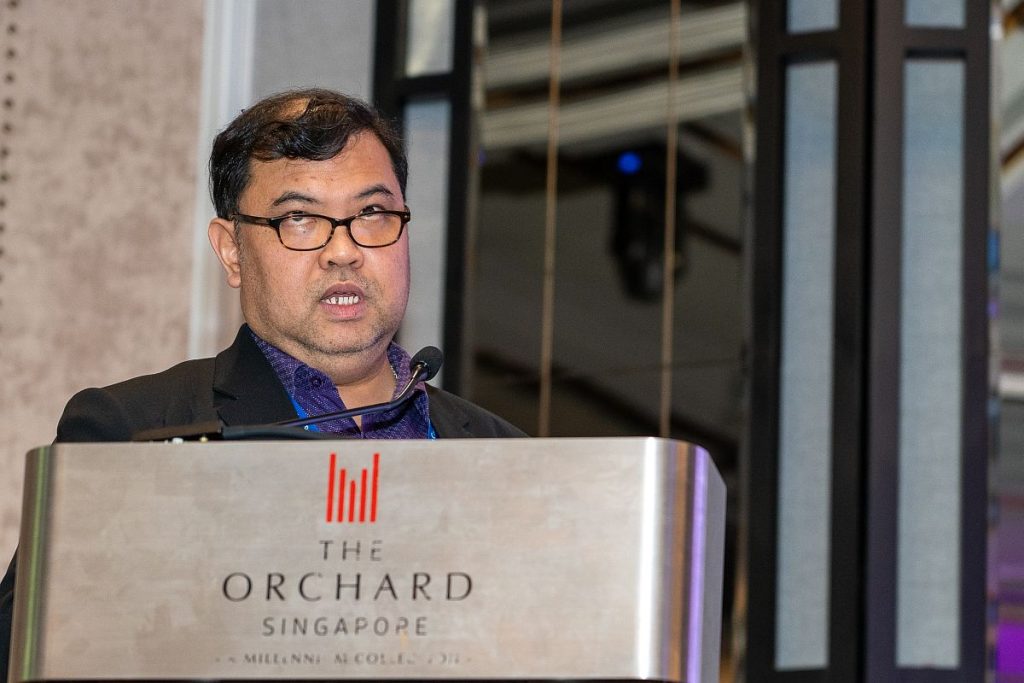
Dr Niramitsantipong revealed that Thailand has a “Dengue Zero MOU” with 11 public-private partnerships on dengue prevention and control between government entities like the Ministry of Public Health, the Bangkok Metropolitan Administration, and the Hospital Administration Association of Thailand; academic associations like the Medical Association of Thailand, the Faculty of Medicine Siriraj Hospital at Mahidol University, the Pediatric Infectious Disease Society of Thailand, and the Infectious Disease Association of Thailand; and private organisations like the Private Hospital Association of Thailand and Takeda.
The MOU launched in January 2022 plans to achieve three goals in 2026: reduce dengue morbidity rate by 25 per cent annually for five years, cut dengue mortality rate to less than 0.01 per cent, and control breeding sites of Aedes mosquitoes in the community to be less than five per 100 households.
“Dengue is still a problem in Thailand,” said Dr Niramitsantipong, noting that the case fatality rate of dengue in Thailand from 2014 to 2023 averaged at 0.1 per cent. “Deaths from dengue are not only in children, but also adolescents and young adults.”
“We believe that the call to action for dengue control and prevention may be increased and may also be related to awareness and assessment of the vaccine. When people’s awareness of the severity of dengue rises, awareness of the vaccine also increases,” he added.
During a panel discussion at the conference, when asked about how Thailand mobilised community support for public health initiatives, Dr Niramitsantipong said Thais realise that dengue is still an important disease in the community and country.
“We also have health volunteers at the community level that can provide knowledge, raising awareness of the villagers. So people in the community can get more involved in prevention and control for dengue.”
There are currently two dengue vaccines available in Thailand that target four dengue virus serotypes. Indonesia similarly has two dengue vaccines.
Indonesia Launches New Coalition to Fight Dengue
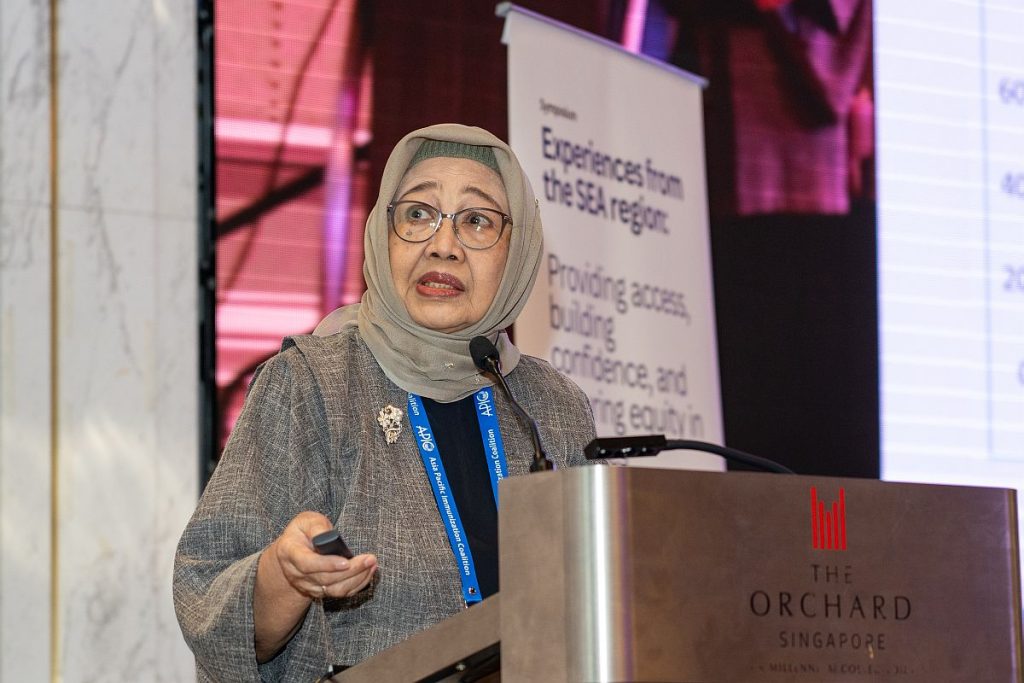
Prof Dr Sri Rezeki Hadinegoro, head of the Indonesian Technical Advisory Group on Immunisation, told the APIC-ADVA Summit that Indonesia launched a new dengue coalition last September.
Kobar Lawan Dengue, a Coalition to Fight Dengue, comprises over 30 leaders from the government, medical societies, academicians, and communities.
“I think local government is very important – collaboration between the Department of Health, Department of Education, Department of Religion, and Department of Internal Affairs should be one team,” Dr Rezeki said at a panel discussion at the conference.
When Galen Centre for Social Policy chief executive Azrul Mohd Khalib remarked that it was impressive to hear about Indonesian Members of Parliament mobilising to fight dengue, Dr Rezeki also admitted her surprise.
“One of the Members of Parliament comes from one area, and in his area, there’s an outbreak, they’re upset about that. So that’s one reason why they have a coalition.”
Dr Rezeki said the dengue incidence rate exceeded 10 cases per 100,000 population in most areas in Indonesia.
“So it’s a very tough problem to reach below 10 for the incidence rate by 2025,” she admitted, adding that Indonesia’s target to reduce the dengue case fatality rate (CFR) to 0.5 per cent in 2025 was also rather high compared to Thailand’s current CFR of 0.1 per cent.
“Dengue remains a major public health concern in Indonesia, with the major incidence in children and productive age; there is a need for implementation of dengue vaccination in children and adults,” Dr Rezeki added.
The Indonesian Pediatric Society and Indonesian Society of Internal Medicine have updated their immunisation schedules to include dengue vaccines that are available in Indonesia.
Malaysia: 91% Increase In Dengue Fever Cases From 2022
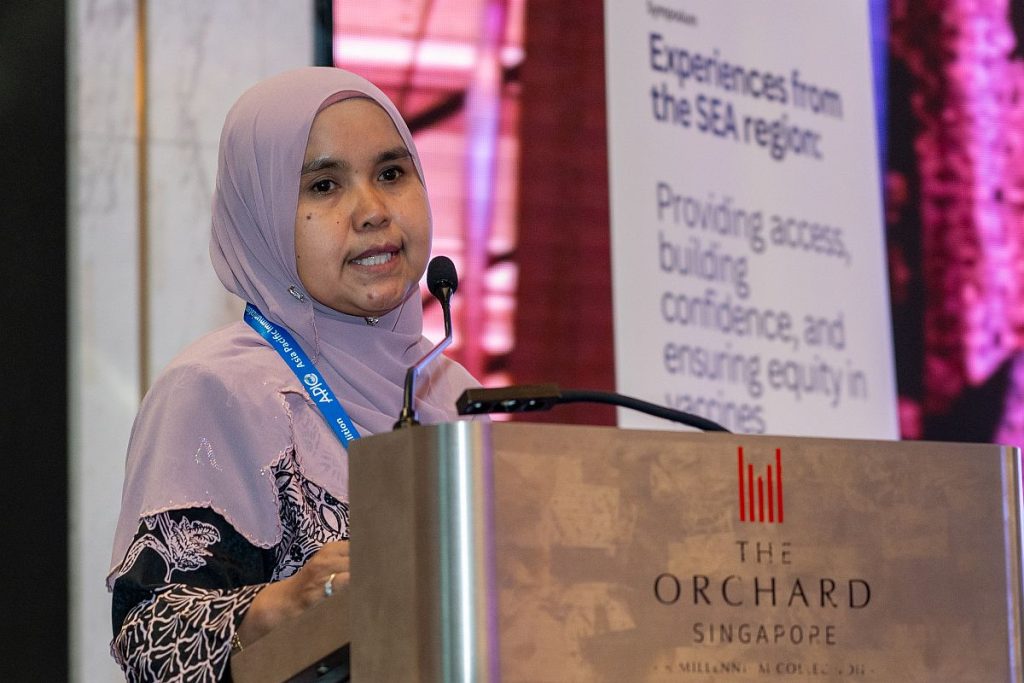
The Ministry of Health (MOH) Malaysia reported last Tuesday that dengue fever cases in the country nearly doubled to 111,417 cases this year until the 48th epidemiological week (November 26 to December 2) from 58,239 cases in the same period in 2022, marking an increase of 53,178 cases (91.3 per cent).
Eighty-four deaths from dengue fever complications were reported this year up to the 48th epid week, a 115 per cent increase from 39 fatalities in the same period last year.
“All layers of society need to be responsible, act proactively, and play their own roles in the effort to curb the rise of dengue fever cases,” Health director-general Dr Muhammad Radzi Abu Hassan said in a statement.
“No Aedes, no dengue, chikungunya, or zika.”
At the APIC-ADVA Summit, an MOH representative did not touch on dengue, but talked about Malaysia’s National Immunisation Programme (NIP), challenges with vaccination, and efforts to increase vaccination rates.
Dr Rozita Ab Rahman, a consultant public health medicine specialist at the Family Health Development Division at the MOH, revealed that the MOH is planning nationwide measles-rubella (MR) supplementary immunisation activities (SIA) next year.
For SIAs, individuals in a defined age group are offered vaccines irrespective of their vaccination status, a common strategy to fill population immunity gaps when routine immunisation services fail to reach all children.
“Going forward, next year, we’re planning for a nationwide non-selective measles-rubella SIA because currently, we’re facing a measles outbreak,” Dr Rozita told the APIC-ADVA Summit.
Among the challenges to maintaining high immunisation coverage in Malaysia, she said, are emerging groups of vaccine refusal parents in the community and pockets of suboptimal vaccination coverage at the subnational level.
Malaysia also faces inadequate uptake of vaccination among non-citizen children that forces the MOH to rely on outreach vaccination services, as well as mopping-up programmes and SIA. The location and population size of non-citizens, especially highly mobile stateless people, present a challenge to vaccination programme planning.
Dr Rozita released MOH data on the number of vaccine refusal cases in Malaysia over the past decade that nearly tripled from 637 cases in 2013 to 1,864 cases in 2022. Despite a slight decline from 2016 to 2020, vaccine refusal cases went back up in the past two years during the Covid-19 pandemic to reach a record high in 2022.
Incidence of vaccine refusal last year was 4.2 cases per 1,000 live births. Vaccine refusals are “hardcore” cases who refuse to get immunised, said Dr Rozita.
The most commonly cited reason for vaccine refusal from 2019 to 2022 was concern over the “halal/ haram” status of vaccines. From 2018 to 2022, the number of vaccine refusal cases with the “halal/ haram” concern totalled 2,217 cases.
Concern by vaccine refusal cases about vaccine content increased 200 per cent in the last two years from 174 cases in 2020 to 523 cases in 2022. This coincided with the rising trend in vaccine refusal over the “halal/ haram” status during the pandemic.
“In the health clinic, every [vaccine refusal] case will be referred for counselling. We have some sort of manual on how to communicate to parents, from those who are hesitant up to the refusal cases,” Dr Rozita told the conference.
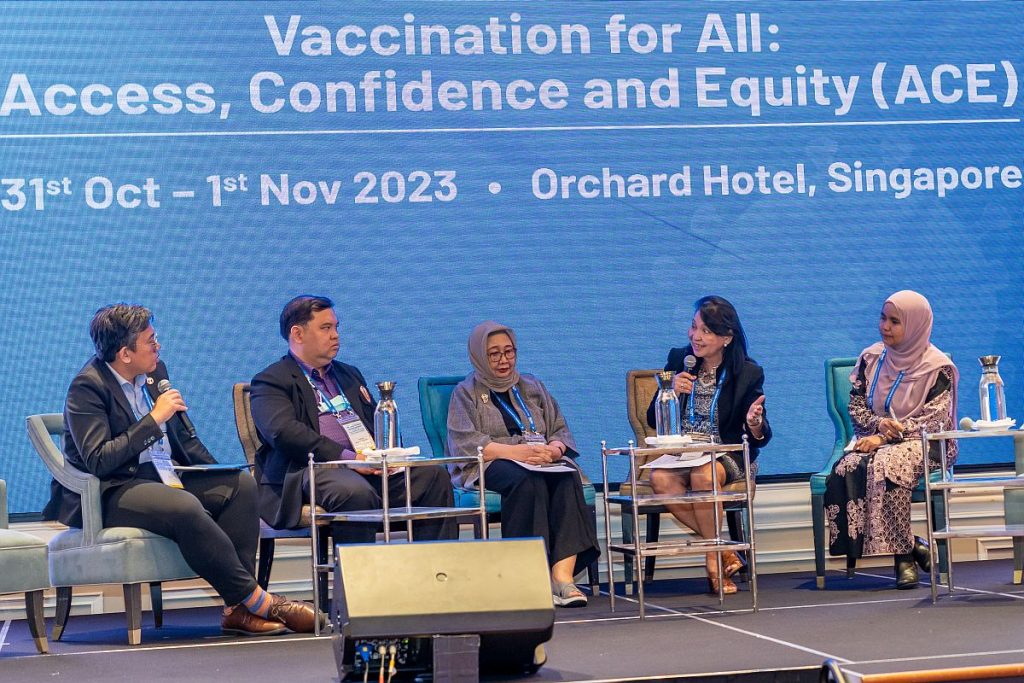
Next year, the MOH is also planning to introduce Tdap vaccines for pregnant mothers to reduce infant pertussis.
Dr Rozita added that the MOH is beginning work on a immunisation registry to collect real-time data from both public and private health care facilities that aims to trace and track defaulters.
“This registry is expanding on the system used during Covid-19, which is MySejahtera,” she said, referring to the Covid-19 turned health app.
Malaysia’s NIP, which has been in place since the 1950s, provides 10 vaccines to children from birth to 15 years. More than 80 per cent of vaccinations under the NIP are provided by public health care facilities.
The pneumococcal shot was the newest vaccine included in the NIP in 2020.
“We have many services running at the ground level, for example in the health clinic, we
have what we call the ‘personalised care concept’ practised by the dedicated staff nurse and
team to create focus in implementing the family health programme, including immunisation
activities,” Dr Rozita told the APIC-ADVA summit.
She also said the hexavalent combination vaccine – which protects against diphtheria, tetanus, pertussis, polio, Hepatitis B, and Haemophilus influenzae type b – has been provided for free to non-citizens since January 2022.
“We practise an open-door policy. Even non-citizens without documents – we accept all of them if they come to our facilities,” Dr Rozita said.
“To reduce inequities, we have a special programme for children refugees under the UNHCR (United Nations High Commissioner for Refugees) and collaboration with NGOs (non-governmental organisations).”



